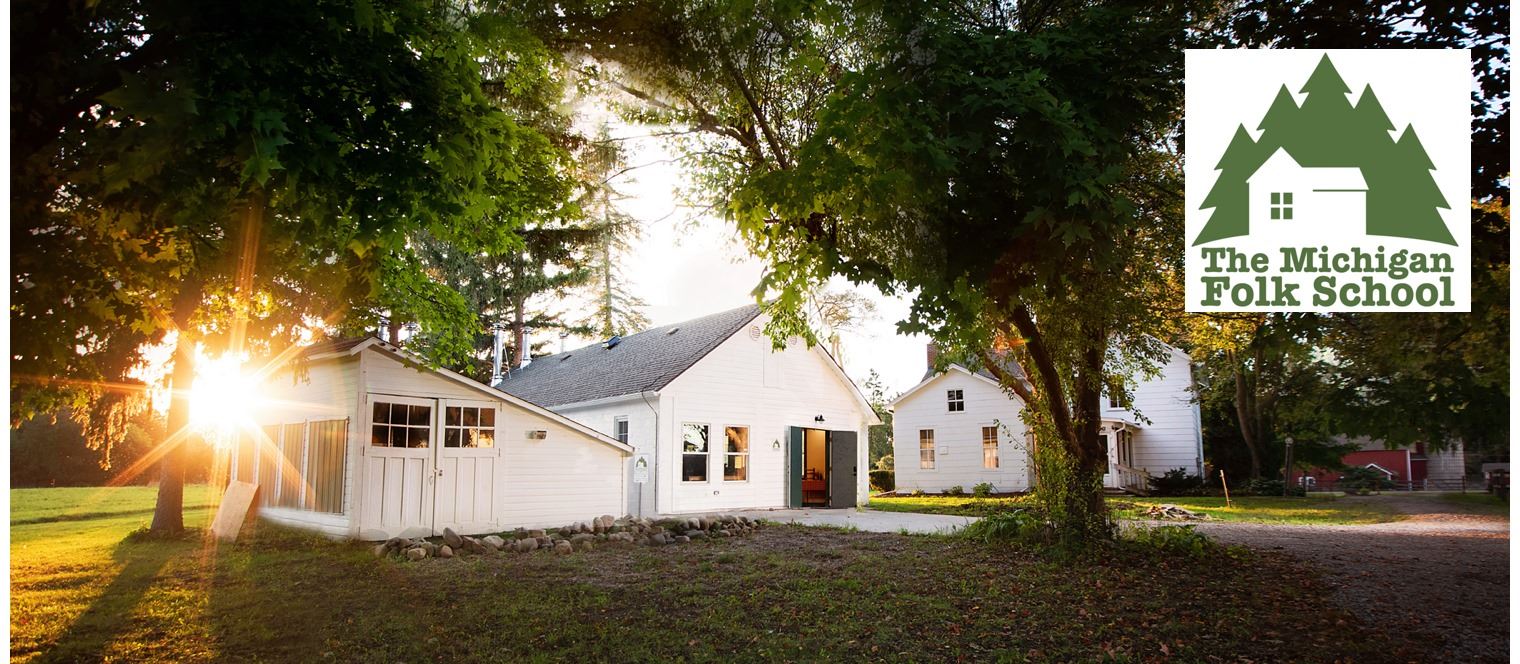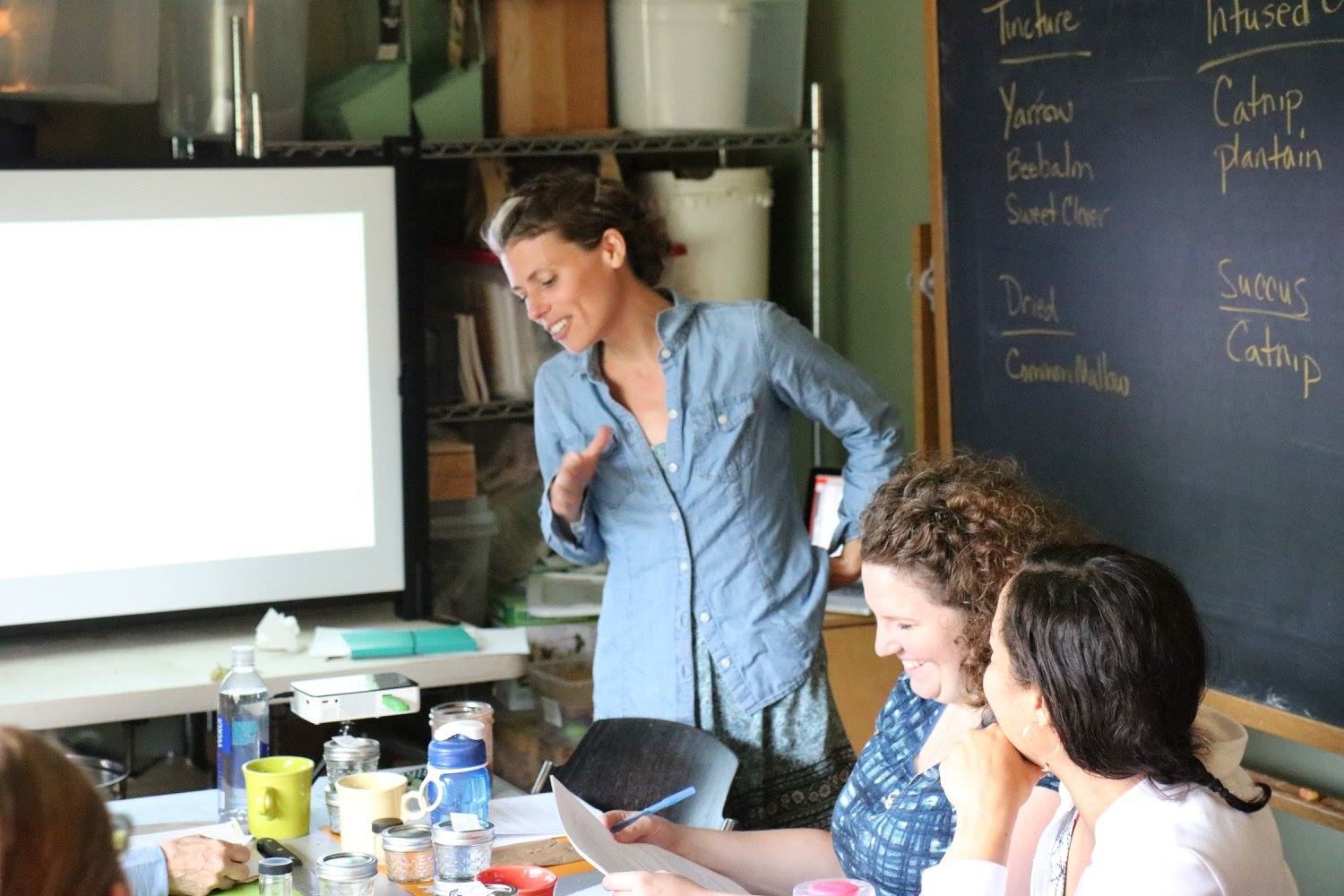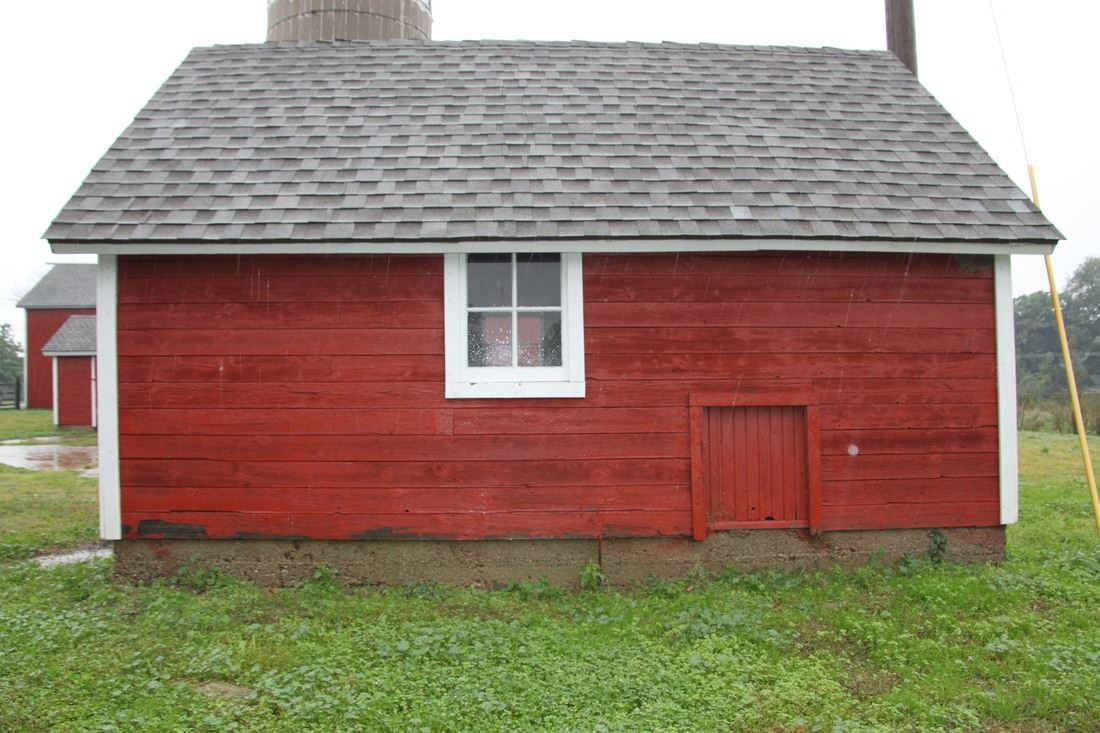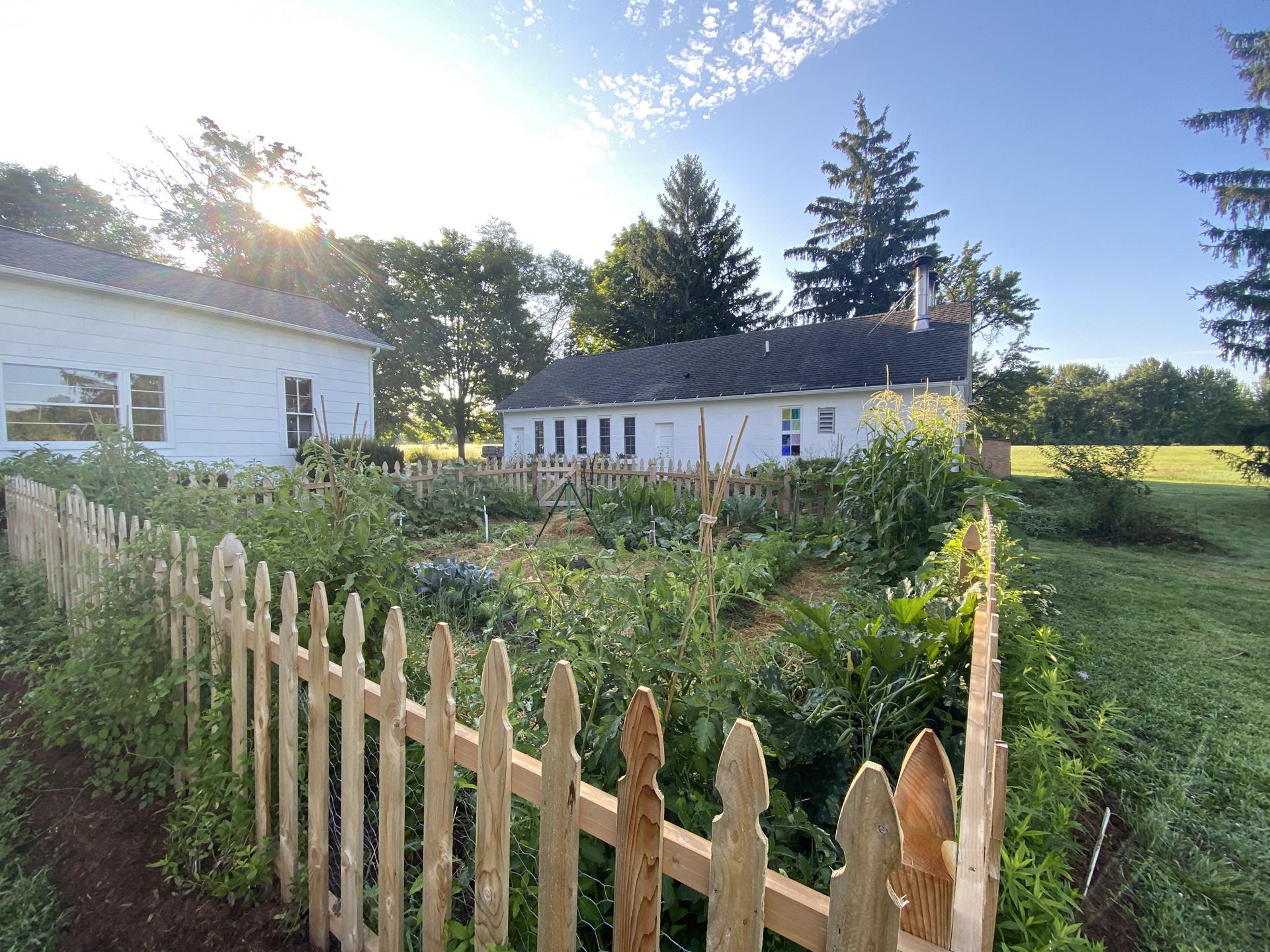-
Not unlike many folk school founding stories, there are many roots to the birth of the Michigan Folk School. But the one that is as good as any to mention first is a baby rattle. In 2002 Jason and Julia Gold, after several years of traveling the world, were settling down back in their Michigan home near Ann Arbor to have their first child. So Jason set to work to make his first rattle! Long story short, one rattle (and lest I rush too fast, a joyful newborn baby!) became tens and hundreds, the toy store business Camden Rose was born, which supported the new growing family and self-made home, which was followed by a period exploring the idea of homesteading, which included learning how to “process chickens” (to eat), which led to officially opening the Folk School in January of 2012. As Jason tells me, his grandfather ’s voice guided him throughout: “Never close your eyes to opportunity!”
-
-
I leave you to glean from this fast sketch the manifestation of some classic folk school elements including home grown, hands on, practical, experiential, and community. Or read the mission statement which tells us that “the Michigan Folk School is committed to creating a community engaged in authentic, hands-on experiences through the teaching and sharing of traditional folk arts, crafts, music, and skills in an inspiring natural setting and to promote the preservation of forest and farmland.”
 There is much more of course, to Julia and Jason ’s personal stories that provided the rich ground of experience from which they drew to create their folk school: South African Waldorf school kids, multiple visits to a school across the mountain from Jason ’s mother ’s western NC home - the John C. Campbell Folk School, learning from the eventual founders of the Fairbanks (AK) Folk School, experiences in artisan worlds of Maine and Vermont, Indiana Amish communities, and the new Driftless Folk School in neighboring Viroqua WI. Over the miles, they experienced and wove together exciting ideas about real learning.
There is much more of course, to Julia and Jason ’s personal stories that provided the rich ground of experience from which they drew to create their folk school: South African Waldorf school kids, multiple visits to a school across the mountain from Jason ’s mother ’s western NC home - the John C. Campbell Folk School, learning from the eventual founders of the Fairbanks (AK) Folk School, experiences in artisan worlds of Maine and Vermont, Indiana Amish communities, and the new Driftless Folk School in neighboring Viroqua WI. Over the miles, they experienced and wove together exciting ideas about real learning.
After the tables were cleared from processing chickens, one of the learning group, from the Viroqua Folk School group, said to Jason: “I think you ’ve just started a folk school.” Indeed! - several short weeks later, on a frosty November weekend, Jason, Julia and a colleague and friend named Ann Stevenson retreated to a cozy cabin to consider ideas that they collectively brought to this possibility. Ann talked enthusiastically about Kierkegaard (not, interestingly, his contemporary N.F.S. Grundtvig!). For Jason, Rudolf Steiner was a central thread for experiences “that I translated thru his eyes and anthroposophy - what I most resonated with as a Waldorf teacher.”
 They discussed the concept of “flow,” as popularized by the psychologist Mihaly Csikszentmihaly (from his book published in 1990). The flow concept seemed to provide a central conceptual flower for their ideas. Indeed, you’ll find on the Folk School ’s website inspiring essays about flow within each teaching craft. For example:
They discussed the concept of “flow,” as popularized by the psychologist Mihaly Csikszentmihaly (from his book published in 1990). The flow concept seemed to provide a central conceptual flower for their ideas. Indeed, you’ll find on the Folk School ’s website inspiring essays about flow within each teaching craft. For example:
“In the world of the artisan, the goal is to find one's flow. In this state of being, the flow enables a focused path that encompasses the optimism of creation, assembly, and “ah-ha” moments. Negative thoughts disappear – there is simply no room for them during creative activity. The gentle and repetitive motion involved in a beautifully manual task like sawing, drilling or sewing can help regulate breathing, heart rate, manage strong emotions and calm a nervous system.
Or … “In a state of Flow, as one ’s attention heightens … the positive energy flow captured in our mind, fostered through focus, begins to release endorphins that enables our mind and body to release deep pleasurable sensations akin to a cathartic experience.”
Jason uses the term “cathartic response” in describing the outcome of finding flow. The trio took Mihaly ’s inquiry about “getting lost in a project” (Jason ’s distinct memory was of total absorption with Legos as a kid) and asked, “Can you get lost in a project (or learning) with other people?”
 Since that November weekend, learning and teaching at MFS quickly took off, and has come to be supported by 3 “pillars.” Jason enthusiastically described then to me:
Since that November weekend, learning and teaching at MFS quickly took off, and has come to be supported by 3 “pillars.” Jason enthusiastically described then to me:
1. “Review - New - Due”
-
- Review: Teaching begins with finding out what the students bring to the class. What do people know? What is their experience? Where do we meet them to determine the next steps? This leads to …
- New, which involves the process of challenging, adapting, and/or changing old patterns and encouraging a new way based in the instructor’s experience. Far from a process of dictating however, change is found through group inquiry and dialogue.
- Due - In the end, we teach ourselves as we learn together and teach each other. MFS strives to create a democratic learning atmosphere.
-
2. The approach to teaching/learning is based on these principles and values, which instructors bring from their experience:
-
- Wisdom over intelligence
- Compassion for each learner
- Welcoming and integrating the full person - especially their cultural background and identity
- The value of our collective equality in this learning endeavor
3. Learning together is the success - there is no failing.
These pillars become a center point of the hiring, assessing, and creating the folk school teaching collaboration - for all teachers and students. Teachers are chosen because they already embody the principles and values. Assessment is carried out in a supportive dialogue with directors and students. And good practice is demonstrated and celebrated.
Again, drawing from the MFS ’s website ’s “flow tab,” we find these “fun quotes” that bring to life the practice of these ideas at work:
“There is something deeply satisfying in shaping leather with your hands. Proper artificing is like a song made solid. It is an act of creation.” (Patrick Rothfuss)
“The whole difference between construction and creation is exactly this: that a thing constructed can only be loved after it is constructed; but a thing created is loved before it exists.” (Charles Dickens)
“I was a shy kid with a broom handle that I pretended was a microphone.” (Patti LaBelle)
“When you have a hammer, everything is a nail. When you have a blacksmith, everything is anything you want it to be.” (Maslow, Kaplan or Twain)
 I asked Jason that essential question, whether there ’s more to what builds the learning community besides a set of inspiring ideas and a gifted community? (which of course are fine foundations by themselves!) More directly, what about the conviction among many Danish folk educators that the residential component is so vital? Jason subscribes to this notion, even while stating the obvious: it ’s a monumental, often prohibiting financial challenge. So, he asks, how can we otherwise create the “living together” element? MFS has a fortunate and exciting adaptation of the idea.
I asked Jason that essential question, whether there ’s more to what builds the learning community besides a set of inspiring ideas and a gifted community? (which of course are fine foundations by themselves!) More directly, what about the conviction among many Danish folk educators that the residential component is so vital? Jason subscribes to this notion, even while stating the obvious: it ’s a monumental, often prohibiting financial challenge. So, he asks, how can we otherwise create the “living together” element? MFS has a fortunate and exciting adaptation of the idea.
2021 will see the construction of a 7000 sq. ft. lodge-type building that will serve as classroom, workshop, and in answer to this question, a community gathering space that will serve as the “heart of the school” - a welcoming informal space for hanging out and connecting, a place to deepen relationship building. Classroom and community meeting spaces, fine tea, coffee, and food of course. It ’s the good fortune brought about by their growing relationship with the local Washtenaw County Parks and Recreation Commission, and its Staebler Farm County Park, that includes the 100-year-old farmstead where some current MFS courses take place. In December 2017, MFS received a matching grant from the Michigan Economic Development Council (MEDC) and successfully raised funds to carry out the project, which will be owned by the County.
 Indeed, in 10 fast years, Doing Folk Education at MFS seems to be “flowing” - Experience, opportunity, fortune, community, and most importantly heart-centered seem to be its fuel and life. Learn more at https://www.mifolkschool.com
Indeed, in 10 fast years, Doing Folk Education at MFS seems to be “flowing” - Experience, opportunity, fortune, community, and most importantly heart-centered seem to be its fuel and life. Learn more at https://www.mifolkschool.com